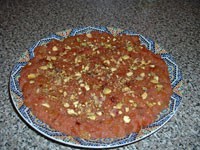Award-Winning Writer Inspired by Two Worlds
Palestinian-American writer Naomi Shihab Nye has fashioned a successful career from a fascination with words, a love of Arab culture and a determination to be heard.
“I had parents who really cared about language and about communication and about using words properly,” she said. “I think from hearing my parents tell stories and read to us before we could read ourselves, I developed a fascination with what words could do.” Nye, the daughter of a Palestinian father and an American mother, lives in Texas. She has won four Pushcart Prizes and the Paterson Poetry Prize, and the Jane Addams Children’s Book Award for her novel “Habibi” and picture book “Sitti’s Secrets.” These books and much of her poetry draw from her experience in two cultures.
“I grew up with a great love for the Middle East and a fascination with it and a desire to travel there and know my family there,” she said.
Nye also grew up with a love of writing, and felt that it came naturally. By the first grade, she was writing poems and short stories. When she was 7, she sent her first work to a magazine to be published.
Though many writers fear rejection and hesitate sharing their works, Nye takes a different approach.
“If they don’t accept your work, it doesn’t mean that you are a failure; it is just a way to make outreach into the world and possibly connect with people you don’t know,” she said.
Another hurdle writers face is finding the time to write, Nye said. What works for her is waking up at 5 a.m. to begin. Nye said that sometimes it just takes little steps to help an aspiring writer find the creative outlet. “I try to encourage people to know that even seven minutes or 10 minutes a day devoted to your own writing can be very beneficial. You don’t have to have a full hour,” she said. “I think in the modern world how to negotiate our own sense of time is one of the most crucial elements in life that we each have to develop.” Writers are sometimes stymied when it comes to finding someone to publish their work. Nye said the Internet can help because it is “an incredibly optimistic and sizzling tool” to open doors of communication.
Moreover, though, aspiring authors need to find self-confidence to publish, she said.
“It also involves, at times, a basic kind of courage just to share something you have written and not have to apologize for it,” Nye said. “That little bit of bravado of belief that helps someone share their work — that is one of the issues.” Nye said she has drawn inspiration in writing from the lives and works of great writers of the past. Two she cited lived worlds apart but represented the two cultures with which she grew up: American poet Emily Dickinson and Palestinian Fadwa Touqan. She said they were similar in that they were women who never married and spent their lives at their family homes, but more important their works touched people in dramatic fashion.
They “wrote these brilliant short poems that changed people’s lives forever,” Nye said. “They are both, I think, strong models for devotion to writing and to education because both were highly educated.” Dickinson lived in the 19th century, but Touqan was a 20th-century poet who died in 2003, and Nye met her while on a visit to Jordan. “She just made an incredible impression on me,” Nye said. “That was one of those unforgettable encounters with a writer that you feel you are a better person forever because you just encountered them once.”
M. Scott Bortot
Arab News



